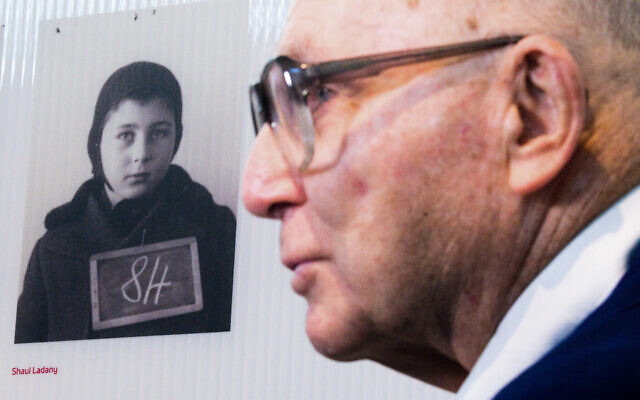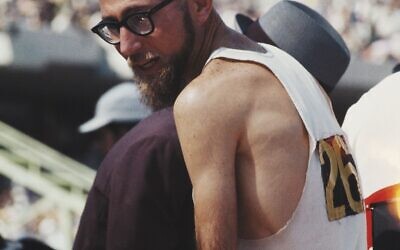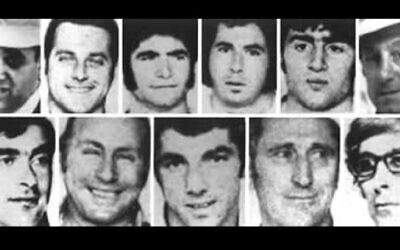Bergen Belsen and Munich Olympics survivor: ‘I am not afraid to die’
Shaul Ladany, now 86, reflects on the 1972 terror attack that took place at the Olympic Games 50 years ago this week.

Shaul Ladany can still clearly remember the third time he cheated death. The Israeli had just competed in the 50-kilometre walk at the 1972 Munich Olympics, and had been taking cuttings from local newspaper reports into the early hours of September 5, 1972 at his Olympic Village apartment in Connollystrasse.
He said he had not been asleep long when a team-mate jolted him awake.
“Somebody touched me, I opened my eyes, and Zelig Shtroch, from the second floor of my apartment, is there,” Ladany, now 86, told the PA news agency.
“He says ‘Moshe has been killed by Arabs’. In the first split-second I thought he was joking. Zelig was my room-mate in Mexico City too and he was a big joker. But in the next split of the second I realised this is something people don’t joke about.”
Ladany says “without thinking” he went to the door of Apartment 2, and found himself four or five metres from the man he now knows was Luttif Afif, the leader of the Black September Palestinian terror group.

Ladany returned inside, and those gathered in Apartment 2 left via a bedroom. Ladany recalls being the last to leave – and was the first to raise the alarm as he walked alongside his building to see the head of the Israeli Olympic mission in Apartment 5 rather than fleeing with the others.
Hostages were taken from Apartments 1 and 3 by Black September. Nine members of the Israeli delegation died when the German authorities’ rescue attempt at the Furstenfeldbruck airfield went wrong. Two others – including Moshe Weinberg, who Zelig Shtroch had mentioned to Ladany – were killed earlier by the terrorists after trying to fight back.
For many, such a close brush with death would be difficult to ever recover from, but Ladany said: “I don’t think psychologically the Munich attack influenced me.
“Before coming to Munich there were attacks on Israelis and on Israeli airlines. I was aware of the risks. I am not afraid to die. I am very cautious with everything, it doesn’t mean that I want to die. But I am not afraid to die.”
Four days after Ladany’s fifth birthday in April 1941, the family took shelter in the laundry room of their home in Belgrade, during a German air raid.
“A bomb entered the house diagonally, hitting on the rear side, the second floor, the ground floor and entered the adjacent basement. Several people were killed. The laundry room saved our lives,” Ladany said.
Despite that near-miss, and the persecution of Jews across Nazi-occupied Europe, he says he never sensed anxiety from his parents and added: “I was never in panic. Maybe it forged our character, to be strong and to look forward.
“Maybe we inherited it from our forefathers, this kind of behaviour of never panicking, always trying to find a way out of very bad situations. This type of behaviour followed me in all my life.

“This navigated us through the war years and saved us. In order for a Jew to survive the Holocaust he did not need a lucky event, he needed a series of lucky events and we had it. It’s not just plain luck, but to navigate our way whenever obstacles occurred or whenever we assumed they might occur.”
The family moved to Budapest, and in 1942 his cousins, Martha and Eva, came to live with them. They were the children of his mother’s sisters, who along with the girls’ fathers had been massacred in the Serbian city of Novi Sad. Ladany’s maternal grandparents died in the gas chambers at Auschwitz.
By March 1944, the Germans were in Hungary and working to deport Jews to the concentration camps.
“First my parents tried to save me, they put me in a monastery and hid my sisters with friends,” Ladany said.
“My father took me at the age of eight to a monastery, we travelled in a coach with a yellow star on it. Before reaching the place, he turned the coat inside out so the yellow star would not be visible. He kissed me, he embraced me.
“A monk appeared, my father told him ‘I brought a kid’. The monk did not ask any questions – he didn’t want to hear lies. He let me in.
“I have never had such an awful time in my whole life, it was the worst. Not because (the monks) had done anything wrong to me, not at all, but I was in trauma all the time, that (the Nazis) might discover that I am a Jew and that they might kill me.
“It was awful – an eight-year-old kid who thinks if he is discovered he will be killed and he has to hide his identity.”
His father took Shaul from the monastery when Allied bombs started to land in Budapest, but the family were eventually taken by train to Bergen-Belsen.
“We were there for half a year, suffering from hunger, cold, abuse,” Ladany said.
The family were able to get out as part of an agreement struck between the Nazis and a Hungarian-Jewish lawyer. Around 50,000 inmates are believed to have died at the camp. Ladany describes reaching refuge in Switzerland as being akin to “arriving in paradise”.
The family emigrated to the newly-formed state of Israel in 1948, where Ladany would develop his prodigious athletic skills.
Heading into the Munich Olympics, Ladany had set a world record for the 50-mile walk which stands to this day.
He recalls the efforts made by the West German organisers to avoid a strong military presence, following the Berlin Olympics of 1936 which Adolf Hitler and the Nazis used as a propaganda tool.
“The aim of the West Germans at that time was to show the world that Germany was not the military machine of the Third Reich, it was a democratic society,” he said.
“Everything was in very nice colours, with many flowers.”
Prior to the attack, Ladany had happily trained alone outside the Olympic Village. Even 50 years on, he remains scathing of the German response to the hostages being seized.
“Israel sent the head of Mossad (the secret service) and an Arabic interpreter to help, but (the Germans) did not want to hear any of his advice,” Ladany said.
“They made up a plan. It was a very amateurish plan, and the execution of it was even worse.”
Ladany is clear in his view that he wanted the Games to continue as a show of defiance.
“I stated that we should not withdraw, because then we are fulfilling the aim of the terrorists and many other countries to kick Israel out from sport and the Olympic Movement,” he said.
Within a year of Munich he had become the 100km world race-walking champion. But Ladany, an emeritus professor at Ben Gurion University in Beersheba, has never forgotten the atrocity that almost claimed his life, and attends memorials for the victims every year.
“Munich is a part of my life. Together with my history at Bergen-Belsen, both were unique and they forged my character. I don’t know which one more or less,” he said.
Ladany remains physically fit and from the age of 50 up to 83 he walked his new age in kilometres on his birthday. The Covid-19 pandemic foiled him on his 84th birthday in 2020, but he walked the half-distance – 42.5km – for his 85th in 2021.
Asked what his experiences had taught him, Ladany said: “I don’t accept stupid regulations.”
He says he refuses to wait for a green light to cross a road if he can see it is clear, and remembers how, on a visit to a Berlin university in the 1970s, he refused to ‘report out’ having reported in to the country.
“I decided knowingly not to report when I returned to Israel, and I was looked for for over 40 years,” he said with a smile.
“My friend (in Germany) told me that periodically letters were sent searching for me (asking) what happened and so on. I told him, they can search for me for 100 years.
“In 1941, if my parents had obeyed orders in Belgrade, when you were told Jews had to report in or risk being shot, we would have been gassed in trucks.
“At Bergen-Belsen, we were told to report our nationality. Inmates discussed what to say, what not to say, what might save them.
“My parents didn’t tell the truth. We told them we were Hungarian. Those that reported as Hungarian were sent to Switzerland (to safety), those that reported as Romanian were left behind.
“So I have learned for things that are very important, the truth is not what you should go with. You should go with what might save you.”

Thank you for helping to make Jewish News the leading source of news and opinion for the UK Jewish community. Today we're asking for your invaluable help to continue putting our community first in everything we do.
For as little as £5 a month you can help sustain the vital work we do in celebrating and standing up for Jewish life in Britain.
Jewish News holds our community together and keeps us connected. Like a synagogue, it’s where people turn to feel part of something bigger. It also proudly shows the rest of Britain the vibrancy and rich culture of modern Jewish life.
You can make a quick and easy one-off or monthly contribution of £5, £10, £20 or any other sum you’re comfortable with.
100% of your donation will help us continue celebrating our community, in all its dynamic diversity...
Engaging
Being a community platform means so much more than producing a newspaper and website. One of our proudest roles is media partnering with our invaluable charities to amplify the outstanding work they do to help us all.
Celebrating
There’s no shortage of oys in the world but Jewish News takes every opportunity to celebrate the joys too, through projects like Night of Heroes, 40 Under 40 and other compelling countdowns that make the community kvell with pride.
Pioneering
In the first collaboration between media outlets from different faiths, Jewish News worked with British Muslim TV and Church Times to produce a list of young activists leading the way on interfaith understanding.
Campaigning
Royal Mail issued a stamp honouring Holocaust hero Sir Nicholas Winton after a Jewish News campaign attracted more than 100,000 backers. Jewish Newsalso produces special editions of the paper highlighting pressing issues including mental health and Holocaust remembrance.
Easy access
In an age when news is readily accessible, Jewish News provides high-quality content free online and offline, removing any financial barriers to connecting people.
Voice of our community to wider society
The Jewish News team regularly appears on TV, radio and on the pages of the national press to comment on stories about the Jewish community. Easy access to the paper on the streets of London also means Jewish News provides an invaluable window into the community for the country at large.
We hope you agree all this is worth preserving.





















